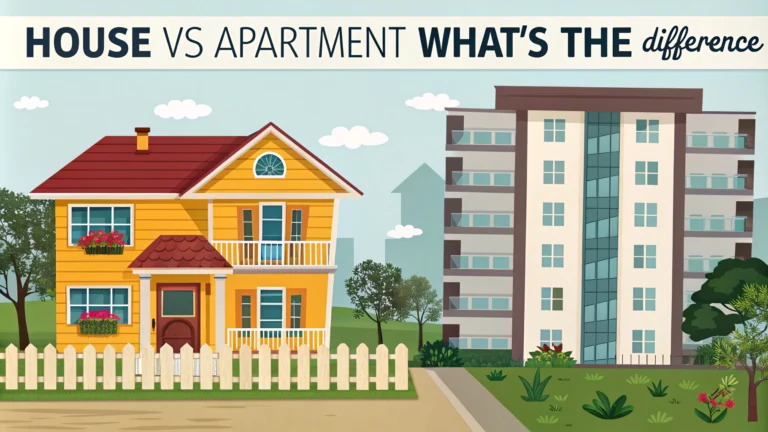Making the decision between a house and an apartment impacts your lifestyle, finances, and long-term satisfaction with your living space. A clear understanding of these differences helps you make an informed choice that aligns with your needs.
Your living arrangement affects everything from monthly expenses to daily routines and future investment potential. Each option comes with unique advantages and responsibilities that require careful consideration.
Understanding Property Ownership and Investment Value
Houses typically offer **full property ownership**, including the land, while apartments usually involve owning just the living space. **Property appreciation** rates differ significantly between houses and apartments, affecting long-term investment returns.
Key ownership considerations:
- Land ownership rights and restrictions
- Property value growth potential
- Resale opportunities
- Building equity options
Space and Layout Considerations
Houses provide more **flexible living space** and opportunities for customization. **Square footage** typically ranges more extensively in houses, offering room for future expansion.
Space comparison table:
| Feature | House | Apartment |
|---|---|---|
| Outdoor space | Private yard | Shared or balcony |
| Storage | Garage/attic options | Limited storage |
| Layout control | Customizable | Fixed structure |
Maintenance and Responsibility
**Maintenance costs** and responsibilities vary significantly between houses and apartments. Houses require more hands-on management and personal responsibility for repairs.
Maintenance differences:
- Houses: Full responsibility for repairs, yard work, and systems maintenance
- Apartments: Shared maintenance costs, building management handles common areas
- Emergency repairs and system upgrades
- Regular upkeep requirements
> “Understanding maintenance responsibilities is key to budgeting and lifestyle planning when choosing between a house and apartment.”
Location Impact on Living Experience
The **proximity** to city centers and amenities shapes daily activities and transportation needs. House locations often require longer commute times but offer more privacy and space.
Key location factors:
- Distance to work and entertainment
- Public transportation access
- Neighborhood amenities
- School district quality
Monthly Cost Analysis
Understanding the complete **financial picture** helps make an informed decision between houses and apartments.
Cost comparison table:
| Expense Type | House | Apartment |
|---|---|---|
| Insurance | Higher rates | Lower rates |
| Utilities | Full responsibility | Some included |
| Property tax | Higher amounts | Often included in HOA |
Community and Lifestyle Fit
**Social connections** and community engagement differ between house and apartment living. Apartments offer built-in community spaces and organized activities, while houses provide more privacy and control over social interactions.
Lifestyle considerations:
- Noise levels and privacy needs
- Pet ownership flexibility
- Social interaction preferences
- Security features and access control
> “Your choice between a house and apartment should match your desired balance of privacy, community, and lifestyle needs.”
Making Your Final Decision
Create a **personalized checklist** based on your priorities in:
- Financial readiness and long-term goals
- Space requirements and family plans
- Maintenance willingness and capability
- Location preferences and commute needs
Consider timing factors:
- Current market conditions
- Personal life stage
- Career stability
- Future family plans
Both houses and apartments can provide satisfying homes when aligned with your specific needs and circumstances. Take time to evaluate each factor carefully before making this significant decision.
House vs Apartment FAQs
Q: What are the main differences between a house and an apartment?
A: The key differences include:
- Ownership structure – houses typically come with land ownership while apartments are units within a larger building
- Space – houses generally offer more square footage and outdoor areas
- Maintenance – house owners handle all maintenance, while apartment buildings have shared maintenance
- Privacy – houses provide more privacy with no shared walls
Q: Are houses more expensive than apartments?
A: Houses typically have higher purchase prices and ongoing costs due to:
- Larger square footage
- Land value
- Full maintenance responsibility
- Higher utility costs
- Property taxes
Q: Which is better for first-time buyers – a house or apartment?
A: Apartments often suit first-time buyers better due to lower entry costs, easier maintenance, and typically better locations near city centers.
Q: Do houses or apartments appreciate faster in value?
A: Houses traditionally appreciate faster because they include land value, which typically increases over time. However, apartment values in prime urban locations can also show strong growth.
Q: What are the insurance differences between houses and apartments?
A: Houses require comprehensive homeowner’s insurance, while apartments typically need less expensive condo insurance as building insurance is covered by body corporate fees.
Q: How do utility costs compare between houses and apartments?
A: Houses typically have higher utility costs due to:
- Larger space to heat/cool
- More external walls exposed to elements
- Individual responsibility for all utilities
Q: What are the parking differences between houses and apartments?
A: Houses usually include private garages or driveways, while apartments may have:
- Designated parking spots
- Shared parking areas
- Limited or no parking
Q: Which is more environmentally friendly – a house or apartment?
A: Apartments are generally more energy-efficient due to:
- Shared walls reducing heat loss
- Smaller spaces requiring less energy
- Concentrated urban development reducing transportation needs
Q: What are the noise differences between houses and apartments?
A: Houses offer better noise control with:
- No shared walls
- Greater distance from neighbors
- Control over all surrounding space
Q: How do storage options differ between houses and apartments?
A: Houses typically offer more storage through:
- Attics
- Basements
- Garages
- Outdoor sheds
While apartments usually have limited storage with possible access to basement lockers or storage units.



















